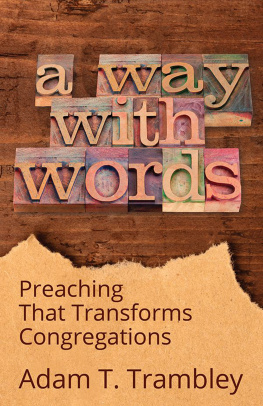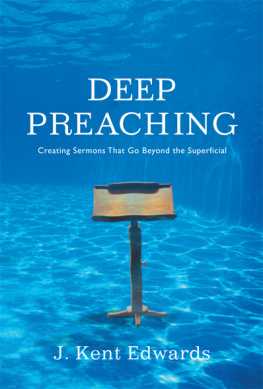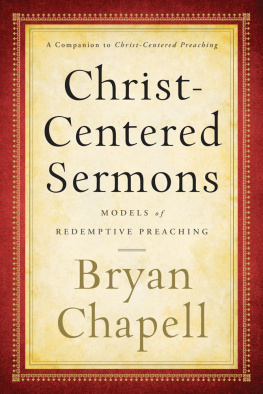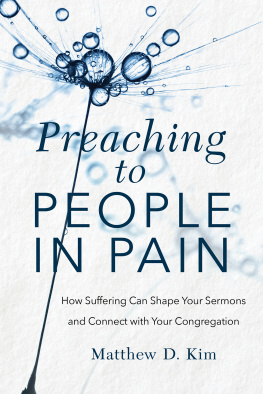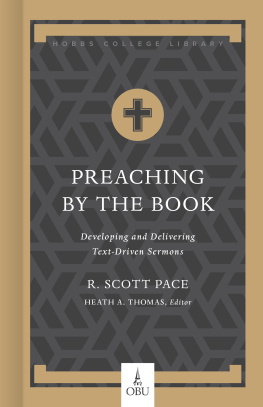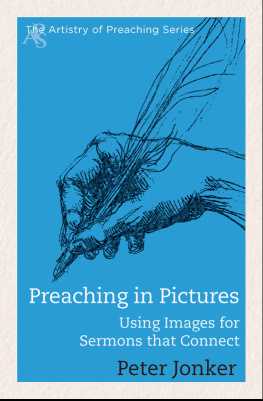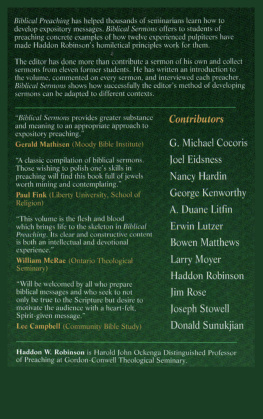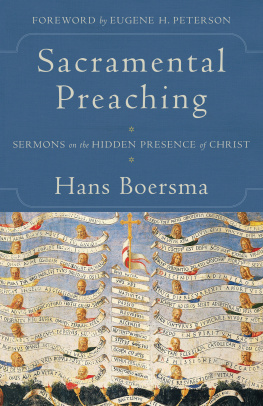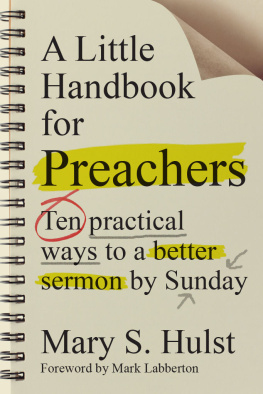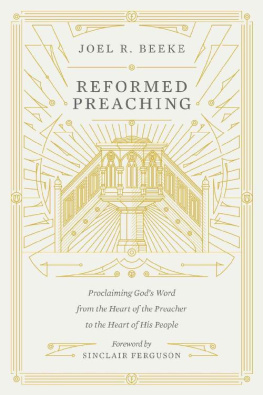The truth has been spoken aloud before God and in Godsname. Now the world may do to us whatever it wishes. Westand in Gods hand. God is faithful. But you, O Land,Land, Land, hear the word of the Lord.
Pastor Julius von Jan,
the Sunday following Kristallnacht
Preaching in Hitlers Shadow
Sermons of Resistance in the Third Reich
Edited by
Dean G. Stroud
WILLIAM B. EERDMANS PUBLISHING COMPANY
GRAND RAPIDS, MICHIGAN / CAMBRIDGE, U.K.
2013 Dean G. Stroud
All rights reserved
Published 2013 by
Wm. B. Eerdmans Publishing Co.
2140 Oak Industrial Drive N.E., Grand Rapids, Michigan 49505 /
P.O. Box 163, Cambridge CB3 9PU U.K.
Printed in the United States of America
19 18 17 16 15 14 13 7 6 5 4 3 2 1
Library of Congress Cataloging-in-Publication Data
Preaching in Hitlers shadow: sermons of resistance in the Third Reich /
edited by Dean G. Stroud.
pages cm
Includes bibliographical references.
ISBN 978-1-4674-3922-0 (pbk.: alk. paper)
1. Church and state Germany History 1933-1945. 2. National socialism and
religion. 3. Sermons, German. 4. Clergy Germany History 20th century.
5. Anti-Nazi movement Germany. 6. Christianity and politics History
20th century. 7. National socialism Moral and ethical aspects. 8. Antisemitism
Germany History 20th century. I . Stroud, Dean Garrett, editor of compilation.
BR856.P74 2013
252.0094309043 dc23
2013020718
www.eerdmans.com
Contents
In the early 1970s I was studying at Austin Presbyterian Theological Seminary in Austin, Texas, preparing for pastoral ministry. As colleagues from my generation will recall, we devoted much time to reading and discussing the three Bs: Barth, Bonhoeffer, and Bultmann. Although we carried around a copy of Bonhoeffers Letters and Papers from Prison, we did not really dwell much on the background of those prison writings. Instead, we tried to figure out what religion-less Christianity might mean, one of the terms he mentioned without providing details. We considered Bonhoeffer the theologian, not only in that book but also in his Cost of Discipleship, where he offered his thoughts on the Sermon on the Mount. We read as if Bonhoeffer were addressing us directly, and not the Confessing Church in Nazi Germany. I cannot recall one lecture on the German Church Struggle that would have put his thought in its historical setting.
Even more so than with Bonhoeffer, the historical context of Barths neoorthodoxy and Bultmanns demythologization of the New Testament never surfaced, at least not in a memorable way. I recall reading long selections from the massive and overwhelming Church Dogmatics. And so I left seminary with little historical background, and went into the parish, where occasionally sermon preparation or a discussion group would bring me back to those names. But I knew no more about the situation in which they lived than I had known at seminary.
My first parish was a small Presbyterian church in Mansfield, Louisiana, during the closing years of the civil rights movement. Although I never experienced hostility to my preaching on current events, I do recall sitting in the study working on the sermon for Sunday with a vague sense of unease when I saw the biblical text moving me into areas of controversy. What to say?
Pastors had three ways to deal with demands for civil rights: (1) we could become Jeremiah and proclaim the radical demand for justice and live with the consequences; (2) we could ignore the streets and the headlines and preach nothing but the gospel and close our eyes to the marches and our ears to the rhetoric; or (3) we could seek middle ground and balance justice with love, preaching the truth in a way that encouraged rather than outraged the congregation. And behind it all was the question, What business had the church mixing with politics?
Years later, I found myself at the University of Iowa doing graduate work in German. I had majored in German as an undergraduate, so when I left the ministry it was like returning to a first love. At Iowa I read widely in German literature, leaving those names from seminary far behind. Goethe, Kafka, and Brecht replaced Barth, Bonhoeffer, and Bultmann.
In 1984 I came to the University of Wisconsin in La Crosse, where I began teaching German and doing research in literature. But one day, I do not recall just when, I decided to use my German to read theology, thus uniting a current interest with one from the past. I began by reading a historical survey of German evangelical thought in the twentieth century, and saw for the first time the historical context of the theologians whose ideas had challenged me in seminary. Barth, Bonhoeffer, and Bultmann became actors in a terrible drama.
It was then that a question came to mind. If Barth, Bonhoeffer, and Bultmann had been young men living in Nazi Germany, what did they say when they preached? I remembered my days as a pastor living in the South in the early 1970s working on sermons, and I considered how much more dangerous it would have been for them to preach in Hitlers shadow. I became interested in sermons from the Third Reich. The thought of preaching inside Hitlers Reich, where words were so dangerous, suddenly fascinated me. Anyone could say anything in London or New York, but what about in Bonn or Berlin?
When I began reading sermons from the Third Reich, I wanted to find sermons by outspoken pastors who denounced Hitler by name and condemned Nazi ideas without nuance or irony. I recalled the great sermons of Dr. Martin Luther King and others who used the pulpit to denounce evil. What had German pastors proclaimed on Sundays? This collection of selected sermons offers a response to that question.
Yet the question that always looms in the background is, What should the church have done? The obvious response is that the church should have spoken out directly and boldly against Hitlerism and anti- The case of the Jewish convert Edith Stein and her sister Rose illustrates the hard truth that such public statements enraged the Nazis rather than changed them. The result in Holland was tragic.
Still, there remains the demand of the gospel to speak out against injustice, not only in the hope of converting the oppressor but also under the Christian obligation to speak truth to power. Each sermon in the collection offers an example of Christian speech in the great storm of Nazism.
Sermons in this collection reflect various oppositional responses to Nazism. Because I am honoring resisting pastors for their courage and faith, I have intentionally omitted outright pro-Nazi sermons. However, I have included enough commentary on Nazi Christian attitudes to ensure that readers gain a sense of how they twisted Christianity to fit Nazi views. Knowing what the pro-Nazi Christians believed provides powerful contrast to the sermons and offers critical background.
Each preacher in this collection, and many not represented here, deserves our respect and gratitude for his Christian witness and courage in the face of terrible evil. Some of these preachers died because of these sermons; all risked their lives.
Finally, I offer these translations as primary sources for readers interested in Christianity inside Hitlers Germany. I first began a book about sermons in the Third Reich but changed to offer translations of sermons in the Third Reich so that readers could draw their own conclusions about Christian opposition to Hitler. I, for one, find these sermons as preachable today as they were then. Times and circumstances have changed, but the truth remains as challenging in our time as it was then.
The documentation system used in the book comprises two types of notes: endnotes that contain bibliographic information and bracketed footnotes that contain commentary by the editor/translator on the texts of the sermons.
Next page

